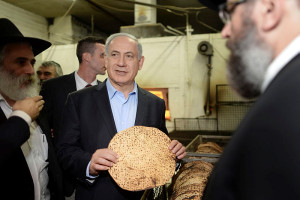There is so much to learn about spirituality from the observance of Passover and by eating matza, the simplest of foods.
By Rabbi Ari Enkin, Rabbinic Director, United with Israel
Happy Passover everyone! I hope you enjoy the holiday as much as I do!
In this special edition of the UWI Torah column, I would like to share some of the symbolic and spiritual interpretations of the matza that we eat during the eight days of Passover.
Actually, in Israel we observe seven days of Passover, just as the Torah commands. For reasons beyond the scope of this article, however, there is an extra day for those who live in the Exile.
Let’s think about it for a moment. Do you know the recipe ? Nope, no yeast. Nope, no baking soda. Nope, no sugar; no salt either! The recipe is simple: flour and water. No additives. No preservatives.
A Symbol of Spirituality
It is because of its minimal ingredients that matza is called lechem oni. Lechem is bread in Hebrew, and oni means poor. Hence, matza is also known as “the poor man’s bread.”
Just as a poor, impoverished person has nothing other than the most absolute basics, so too, the bread of Passover is made of nothing but the absolute basics. This basic – flour and water only – content of matza symbolizes both a process of simplicity and refinement as well as spiritual freedom.
The Talmud teaches that the more a person is occupied with the physical world and the pursuit of material possessions, the more his mind is occupied with worldly matters, rather than spiritual ones. The poor person, on the other hand, has no possessions and is therefore only minimally occupied with the physical and material world. As such, it might just be that it is the poor people who are more focused on spirituality and spiritual growth.
Maybe, just maybe, the matza that we eat on the holy night of the Passover Seder, the night when God redeemed us from Egypt and solidified us as His nation and His people, is there to remind us that if we truly want to connect with Him, we need to focus on simplicity.
Return to Land of Israel was a ‘Miracle of Simplicity’
Sure, we all want wealth. And of course we have needs that must be met. But the matza is there to remind us that the endless pursuit of possessions and wealth is not the true “route out of Egypt” that a person is to take if he wants to get closer to God.

PM Benjamin Netanyahu visits Kfar Chabad matza factory. (Photo: Kobi Gideon/Flash90)
The return of the Jewish people to the land of Israel was nothing less than a “miracle of matza,” a miracle of simplicity. Simply look through the pages of history and see how we have defied all the rules. No nation ever maintained its identity in a state of exile as we have. No nation had the audacity, after 2,000 years of exile, to return home, pick up the pieces and rebuild a country on the ashes of the Holocaust. We were a handful of destitute survivors with little weaponry who managed to take out the armies of five powerful countries and declare the State of Israel.
Therefore, with every bite of matza that you take this Passover, remember that we are a people of miracles. We are a people that does not need endless amounts of wealth and material possessions in order to succeed. We defy the laws of history and nature. Appreciate what you have. If you needed more, God would have ensured that you had it.
Celebrate the miracles. Celebrate your freedom. Celebrate your simplicity!


